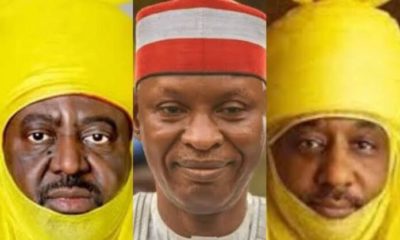NEWS
Court Halts Sanusi’s Return As Emir Of Kano

A new twist has emerged in the political whirlwind surrounding the ancient stool of the Emir of Kano, which saw the Kano State House of Assembly embark on frantic legislative actions to pave way for the return of deposed Sanusi Lamido Sanusi to the throne of his fathers.
A judicial intervention has disrupted the process, with a Federal High Court in Kano having issued an order stopping the Kano State Government from enforcing the Kano State Emirate Council Repeal Law.
The order, by Justice Mohammed Liman granted followed an application by Alh Aminu Babba Dan Agundi, the Sarkin Dawaki Babba of the Kano Emirate.
Consequently, the court slated 3rd of June, 2024 for the hearing of the matter.
The high profile matter has seen the court papers on the matter being widely circulated on the Internet.
Recall that the Kano State House of Assembly, on Thursday, issued a dissolution order to all the four emirate councils in the state created by the administration of the immediate past governor, Umar Ganduje.
To underscore the political plot, Kano State Governor, Abba Yusuf, instantly deployed security operatives to dislodge the Emirs and ordered a return of Sanusi.
In a dramatic fashion Gov Yusuf in complying with legislative resolutions and actions, deposed five emirs appointed by Ganduje and gave them a 48-hour ultimatum to vacate their official residences and palaces.
They royal fathers were directed to hand over all affairs to the state’s Commissioner for Local Government and Chieftaincy Affairs.
However, in the latest lawsuit concerning the Emirs’ seat, predicated on fundamental rights the Kano State Government, the Kano State House of Assembly, the Speaker, the Attorney-General, the Commissioner of Police, the Inspector-General of Police, the Nigeria Security and Civil Defence Corps (NSCDC), and the State Security Service, were names as the respondents.
In addition, the court ordered that all court processes be served on the IGP in Abuja.
The judge ruled, “That parties are hereby ordered to maintain status quo ante the passage and assent of the bill into law pending the hearing of the fundamental rights application.
“That in view of the constitutional and jurisdictional issues apparent on the face of the application, parties shall address the court on same at the hearing of the fundamental rights application which is fixed for the 3rd of June, 2024.
“That in order to maintain the peace and security of the state, an interim injunction of this Honourable Court is granted restraining the fifth to eight respondents (CP, IGP, NSCDC and DSS) from enforcing, executing, implementing and operationalising the Kano State Emirate Council (Repeal) Law.
“That parties are hereby ordered to maintain status quo ante the passage and assent of the bill into law pending the hearing of the Fundamental Rights application.
“That this case is adjourned to the 3rd day of June 2024, for hearing of the fundamental rights application.”
“Status quo ante” refers to the previously existing state of affairs.
Biztellers reports that the repealed law, known as the Kano State Emirs (Appointment and Deposition) Law, had created Rano, Karaye, Gaya, and Bichi Emirates in addition to Kano.
The legislative action of the Kano State’s House of Assembly meant that the law passed by the previous assembly was repealed and emirates created thereby dissolved, thus consolidating the Kano Emirate into one under a single ruler.
NEWS
Senator Ifeanyi Ubah Laid To Rest In Nnewi Amidst Tight Security
On Friday, November 22, 2024, the late Senator Ifeanyi Ubah was laid to rest in his hometown of Nnewi, Anambra State.
The funeral, held at his residence in Umuanuka, Otolo Nnewi, was attended by a multitude of mourners, including political figures, business associates, and community members, all paying their final respects to the esteemed businessman and politician.
The burial proceedings commenced with a funeral mass at 10:00 a.m., followed by condolence visits and other funeral activities. The ceremonies are scheduled to continue through the weekend, culminating in a Thanksgiving Mass and Outing Service on Sunday, November 24, at St. Peter Claver Catholic Church in Otolo Nnewi.
READ MORE: JUST IN: Anambra Senator, Ubah, Dies In London
In light of security concerns, Anambra State Governor, Prof. Chukwuma Soludo, ordered the closure of schools in Nnewi for a week. This decision followed threats from separatist elements who vowed to attack those attending the burial. A circular from the state Ministry of Education directed school principals to inform parents and ensure students remained at home during this period.
The Anambra State Police Command addressed an incident that occurred on Wednesday night, clarifying that it was not related to the burial. According to the Command’s Public Relations Officer, SP Tochukwu Ikenga, the incident involved security operatives mistakenly engaging police personnel, leading to an exchange of gunfire. The situation has since been brought under control.
Senator Ifeanyi Ubah, who represented Anambra South Senatorial District, passed away in London in July 2024 at the age of 52. His death was met with an outpouring of grief from across the nation, with many acknowledging his significant contributions to the development of Anambra State and Nigeria.
As the community of Nnewi and the nation at large bid farewell to Senator Ubah, his legacy as a philanthropist, businessman, and public servant continues to resonate, leaving an indelible mark on those he served and inspired.
NEWS
Simon Ekpa’s Arrest Will Restore Peace In South East, Says Enugu Gov’t
The Enugu State Government has commended the Republic of Finland for the arrest of Simon Ekpa, a Finland-based leader of the proscribed separatist group, Autopilots.
Ekpa has been accused of orchestrating violence and chaos in Nigeria’s South East region.
In a statement issued on Friday by the Secretary to the State Government, Prof. Chidiebere Onyia, the government described Ekpa as a “common criminal, con man, and terrorist” who has exploited the Igbo people while claiming to represent their interests.
RELATED NEWS: Finnish Police Arrest Simon Ekpa Over Terror-Related Allegations
“The Enugu State Government welcomes the arrest of the Finland-based terrorist, Simon Ekpa,” the statement read.
“His arrest and trial will no doubt go a long way in strengthening peace, security, and stability in all parts of the South East.”
The state government accused Ekpa of sponsoring violent activities that have resulted in the loss of lives, destruction of property, and disruption of the region’s economic activities.
It stated that Ekpa’s actions were driven by personal greed and not genuine concern for the Igbo people.
Onyia said, “Ekpa is a murderer and fraudster who delights in killing his people and living large off their misery.
“He thrives on manipulating, exploiting, and extorting the people on the pretext of fighting for their interest and for the restoration of Biafra.”
The government emphasized its readiness to provide evidence of Ekpa’s alleged crimes to support his prosecution, whether in Finland or Nigeria.
“This arrest is in line with the demand of the Governor Peter Mbah Administration, which has repeatedly made it known that Ekpa is a megalomaniac, common criminal, murderer, and fraudster who takes joy in feeding fat on the manipulated emotions of Ndigbo and inflicting misery on the South East region,” the statement added.
The government further criticized Ekpa for fostering a climate of fear and insecurity that has harmed the entrepreneurial spirit and economic growth of the Igbo people.
“Ekpa has for long, and unfortunately from Finland, made a living by creating a siege climate and mentality in the South East, destroying lives, property, and the Igbo trademark of entrepreneurship and hard work,” Onyia said.
The Enugu State Government expressed optimism that Ekpa’s arrest would mark a turning point in the quest for peace and stability in the South East, urging residents to remain vigilant and supportive of ongoing efforts to restore normalcy in the region.
NEWS
JUST IN: COP29 Proposes $250bn Annual Climate Finance Target For Developing Nations
The COP29 presidency has unveiled an ambitious climate finance plan, calling on developed nations to provide $250 billion annually to developing countries by 2035.
The proposal, part of a broader initiative to mobilize $1.3 trillion from public and private sources each year, seeks to address the mounting challenges posed by climate change.
The five-page draft text, released on Friday, emphasizes the need for developed nations to lead the charge in financing climate action.
RELATED NEWS: COP29: Climate Summit Faces Deadlock Over Vague Funding Proposals For Vulnerable Nations
According to the document, this financial commitment is seen as a critical step toward combating the climate crisis and fostering sustainable development globally.
“In this context, it is decided to set a goal in extension of the goal referred to in paragraph 53 of decision 1/CP.21, with developed country Parties taking the lead, to USD 250 billion per year by 2035 for developing country Parties for climate action,” the draft states.
The announcement follows the release of an earlier 10-page draft on Thursday, which drew significant criticism from Global South delegations.
Many expressed frustration that the document lacked clear financial commitments from wealthier nations, falling short of expectations to support adaptation and mitigation efforts.
“There is a clear need to address the principle of common but differentiated responsibilities, especially given the diverse circumstances shaping national priorities,” a negotiator from a developing country delegation remarked.
The updated proposal aims to address some of these concerns by outlining more specific targets. However, skepticism remains among some negotiators, who feel the revisions still fail to adequately address their demands.
Meanwhile, developed countries have raised their own reservations about the proposed plan.
A European negotiator, speaking to Reuters, described the $250 billion annual target as unrealistic and criticized the lack of measures to expand the pool of contributing countries.
“No one is comfortable with the number because it’s high, and there’s almost nothing on broadening the contributor base,” the negotiator said.
The mixed reactions underscore the persistent divide between developed and developing nations in climate negotiations.
While the draft text aims to reconcile these differences, the gap between expectations and commitments remains a significant hurdle.













